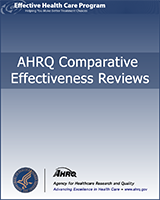This publication is provided for historical reference only and the information may be out of date.
Comparative Effectiveness, Safety, and Indications of Insulin Analogues in Premixed Formulations for Adults With Type 2 Diabetes
Comparative Effectiveness Reviews, No. 14
Authors
Investigators: Rehan Qayyum, MD, Lisa M Wilson, ScM, Shari Bolen, MD, MPH, Nisa Maruthur, MD, Spyridon S Marinopoulos, MD, MBA, Leonard Feldman, MD, Padmini Ranasinghe, MD, MPH, Muhammad Amer, MD, and Eric B Bass, MD, MPH.Affiliations
Excerpt
To date, no one study has compared premixed insulin analogues with other insulin and noninsulin antidiabetic agents in terms of reducing fasting and postprandial glucose, A1c, microvascular and macrovascular diabetic complications and in terms of the side effects of treatment. Clinicians may be better able to choose the most effective therapy for their patients with diabetes if they have the results of an objective, impartial, comprehensive evidence-based review of the comparative effectiveness and safety of different therapeutic options for the treatment of type 2 diabetes. We have therefore performed a systematic review of published studies dealing with the comparative effectiveness and safety of all premixed insulin analogues that are approved by the U.S. Food and Drug Administration (FDA) and available in the United States.
Prepared for: Agency for Healthcare Research and Quality, U.S. Department of Health and Human Services.1 Contract No. 290-02-0018. Prepared by: The Johns Hopkins University Evidence-based Practice Center.
Suggested citation:
Qayyum R, Wilson LM, Bolen S, Maruthur N, Marinopoulos SS, Feldman L, Ranasinghe P, Amer M, Bass EB. Comparative Effectiveness, Safety, and Indications of Insulin Analogues in Premixed Formulations for Adults with Type 2 Diabetes. Comparative Effectiveness Review No. 14. (Prepared by the Johns Hopkins University Evidence-based Practice Center under Contract No. 290-02-0018.) Rockville, MD: Agency for Healthcare Research and Quality. September 2008. Available at: http://effectivehealthcare.ahrq.gov/healthInfo.cfm?infotype=all&reptype=allfinal
This report is based on research conducted by the Johns Hopkins Evidence-based Practice Center (EPC) under contract to the Agency for Healthcare Research and Quality (AHRQ), Rockville, MD (Contract No. 290-02-0018). The findings and conclusions in this document are those of the authors, who are responsible for its contents; the findings and conclusions do not necessarily represent the views of AHRQ. Therefore, no statement in this report should be construed as an official position of the Agency for Healthcare Research and Quality or of the U.S. Department of Health and Human Services.
This report is intended as a reference and not as a substitute for clinical judgment. Anyone who makes decisions concerning the provision of clinical care should consider this report in the same way as any medical reference and in conjunction with all other pertinent information.
This report may be used, in whole or in part, as the basis for development of clinical practice guidelines and other quality enhancement tools, or as a basis for reimbursement and coverage policies. AHRQ or U.S. Department of Health and Human Services endorsement of such derivative products may not be stated or implied.
None of the investigators has any affiliations or financial involvement that conflicts with the material presented in this report.
- 1
540 Gaither Road, Rockville, MD 20850. www
.ahrq.gov
